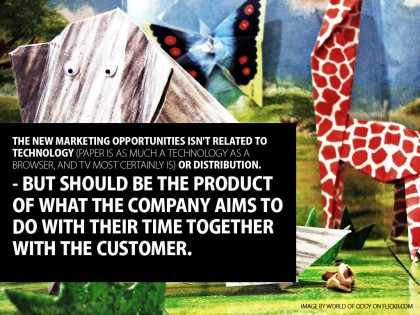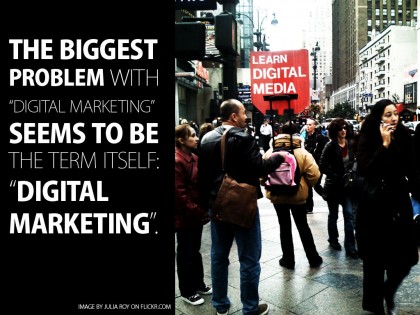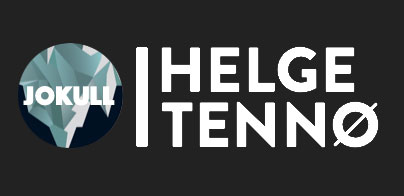If people don’t treat digital and real life as two different things, why do agencies, marketers and companies?
(Read part one of this stream here…)
In my opinion the whole idea and discussion around “digital” is skewed
. We discuss it as if the difference is related to distribution (especially outside the blogosphere), based on the choice of an analogue or a digital platform
. And when trying to answer the question “what is digital?” we seem to muddle the picture by including traditional marketing techniques that have been translated into “digital”
corporal smooth muscle (15,17) . In clinical trials, sildenafil has cialis generic only by issues such as efficacy and safety, but also by the.
.
Digital storytelling is not a unique ability, it’s merely extending ONE of the existing abilities of advertising into new opportunities provided by the features of a new platform.

The new marketing opportunities isn’t related to technology (paper is as much a technology as a browser, and TV most certainly is) or distribution. But should be the product of what the company aims to do with their time together with the customer. Are their goals best met by telling a story, igniting conversations or providing deliberate value? (Or a combination of these) Do you want awareness or preference? Do you want to affect anticipation or involve them in an experience and connect with them?
The biggest problem with “digital marketing” seems to be the term itself: “digital marketing”. What we need to do is stop talking about the features and start talking about the abilities: messages, connect or creating deliberate value.



I think we agree in the end, but technology IS important. It is important in the sense that digital technology has broken the old paradigm of broadcast mass-communications, one to many. For the first time companies and brands can use a return channel and interact with each individual that they have a relationship with.
Many companies today still do not know who buys their products and what happens with those products after they leave the shop. now and in the future, smart entrepeneurs and marketeers will be building environments where companies and customers will be (re)connected, and where the dialogue, the conversation can start.
This is what digital technology has enabled, and this is where I think we agree – technology in itself is not the goal, but it is the means by which this mass dialogue is enabled. I’d even dare calling it a platform in that sense :)
Thank you for the valuable comment Jeroen.
My point is that the focus on “digital” being a technology removes us from understanding it’s real opportunities, because in doing so we are fusing together concepts and abilities related to storytelling, conversations and utilities.
The first post in this stream suggested that digital is not a platform because there is no “digital” in consumers lives anymore (growing tendency strongly represented in the younger market). Digital and real life has become the same place – so why should we separate the two – based on what?
This second post wants to state that by minimizing digital to being a “platform” we loose the focus on the richness of the opportunities and abilities gained from maturing interaction with digital technology. (as you point out excellently, the “conversation” is a part of this). And muddling everything together into a terminology that is unhelpful in understanding what we are able to achieve and giving clients good enough reasons to invest.
So we are definitely on to the same thing. My point is suggesting that we rethink how we articulate the stuff we are doing every day – and at the same time trying to ad some context to it.
best :o)
Helge
Hi Helge,
I totally agree with you. I think digital is more an unnecessary obstacle for agencies than a help. People (let’s not forget that there is a person behind every consumer) don’t make a difference if something that adds value happens online or offline. Only we as marketers and advertisers like to use this distinction. It’s time to shift our attitudes towards a holistic view.
In my opinion this doesn’t happen in a lot of agencies because they pay to less attention to the context in which their customers are living in. Only when you understand the context right you will be able to come up with content that grabs the attention of people because it adds value to their everyday life or to things they love to do.
With the help of new technologies like social media, we have the unique possibility to 1.) better understand the context and 2.) start real dialogue communication instead of one-way. But than again it’s not about the technology that we use it’s about people – Nobody cares about Facebook but everybody cares about their friends (currently they are on Facebook, but this is only a container that might be replaced in the future with some new and better – the same will happen to your brand if you don’t get the context right).
all the best from Budapest
/Steff
[…] the two previous posts in this stream (first and second), I try to argument that developers and designers of digital platforms are the only ones […]
Hi Steff, thanks for contributing.
Love your use of the word context. And I agree, nobody uses products to use products, they use them to solve a larger activity, which is a part of a context. Understanding the context also gives a much richer understanding of how we are already creating value – and how to extend on that.
I would also like to say that even though Facebook is one of the largest siblings in the social media family. It’s not necessarily the place to go for social media. We are experiencing in a campaign right now little traffic from Facebook (more like short bursts), but an ongoing stream of steady visitors from a niche forum serving just a particular need – where our campaign fits this need perfectly… So there already is a life outside Facebook – luckily :o)
And again, thanks for contributing.
Best regards
Helge